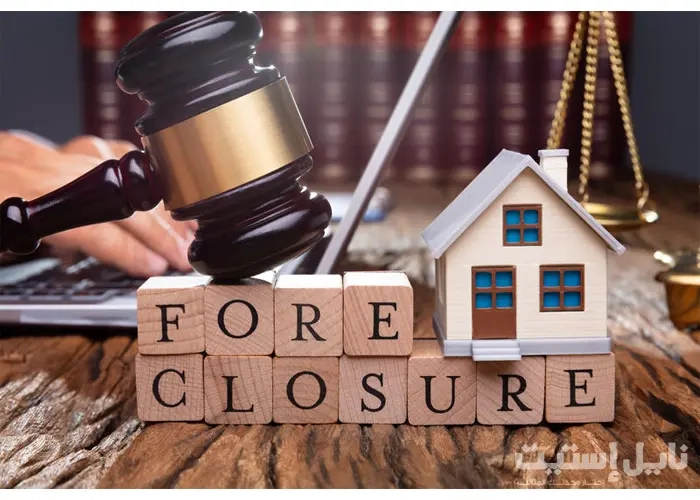Real Estate For Foreclosure In Egypt
Results
Hot Spots
Feb 18
Seen: 518
Listing ID : 6029
Feb 18
Seen: 5836
Listing ID : 2679
Popular Searches
Real Estate For Foreclosure In Egypt
Foreclosure is a legal process in which a lender, typically a bank, takes possession of a property from a borrower who has failed to make the required payments on their mortgage. Mortgaged properties are one of the most common ways people borrow money from financial institutions, using their property as collateral. This article will explore the concept of foreclosure, its impact on the real estate market, the types of mortgages, and the benefits and risks associated with mortgaging properties.

What Is Foreclosure?
Foreclosure occurs when a borrower defaults on a mortgage loan. The lender then has the legal right to seize and sell the property to recover the unpaid loan amount. Mortgaged properties are often used by individuals and businesses to secure loans, as they provide the lender with a tangible asset to claim if the borrower fails to repay the debt.
The foreclosure process can be long and stressful for borrowers, but it is an essential part of the financial system that ensures lenders can recover their funds. It is particularly relevant in the real estate market, where many properties are bought and sold with the assistance of loans.
How Does Foreclosure Work?
In a foreclosure, the lender must follow a specific legal process before taking ownership of the property. This process typically begins after the borrower has missed several mortgage payments. The lender will send notices of delinquency and warnings before initiating foreclosure proceedings. If the borrower is unable to resolve the debt, the lender will file a lawsuit to gain ownership of the property.
Once the court approves the foreclosure, the property is sold at auction. The proceeds from the sale are used to pay off the remaining loan balance. If the sale does not cover the full amount, the borrower may still be responsible for the remaining debt, known as a deficiency judgment.
Why Do People Choose to Mortgage Their Property?
Mortgaging a property provides individuals with quick access to funds without selling their home. This method is often used to finance large expenses such as home renovations, starting a business, or paying off other debts. The borrower retains ownership of the property as long as they continue to make regular payments to the lender.
Mortgaged properties are particularly appealing for homeowners who want to leverage the equity in their homes for financial gain. This type of loan allows them to borrow money while keeping the property as an investment, as long as they can keep up with the mortgage payments.
Types of Mortgaged Properties
There are several different types of mortgage agreements, each with its own terms and conditions. The following sections outline the most common types of mortgage loans available.
- Fixed-Rate Mortgages
Fixed-rate mortgages have a consistent interest rate throughout the life of the loan. This means that the borrower pays the same amount every month, regardless of fluctuations in the market. This type of mortgage is preferred by those who want a stable, predictable payment plan.
A fixed-rate mortgage provides peace of mind to borrowers because they know exactly how much they will need to pay each month. However, the interest rates on these loans tend to be slightly higher than those on adjustable-rate mortgages. The stability they provide, though, often outweighs this drawback for many borrowers.
- Adjustable-Rate Mortgages (ARM)
An adjustable-rate mortgage, or ARM, has a variable interest rate that changes based on market conditions. While ARMs often start with a lower initial interest rate than fixed-rate mortgages, the payments can increase over time. This type of mortgage is riskier for borrowers because they do not know how much their payments will be in the future.
In the early years of the loan, ARMs may offer lower payments, making them attractive to buyers who plan to sell or refinance before the rates adjust. However, the potential for rising payments can put significant financial strain on borrowers if interest rates increase.
- Income-Linked Mortgages
Income-linked mortgages are designed to adjust payments based on the borrower’s income. If the borrower’s income increases, so do the monthly payments. Conversely, if the income decreases, the payments are reduced. This type of mortgage is ideal for individuals with irregular income, such as freelancers or business owners, as it offers flexibility based on their financial situation.
This arrangement provides borrowers with the advantage of adjusting their payments according to their income fluctuations. However, it can also mean that the total cost of the loan is higher in the long term, as lower payments in early years may lead to higher interest rates overall.
- Home Equity Loans
A home equity loan, often referred to as a second mortgage, allows homeowners to borrow against the equity in their home. The equity is the difference between the property’s current market value and the outstanding mortgage balance. Home equity loans are typically used for major expenses such as home improvements, education, or medical bills.
This type of loan is beneficial for those who need a significant amount of money upfront. However, it comes with the risk of losing the home if the borrower is unable to make payments. Additionally, home equity loans usually have higher interest rates than first mortgages.

The Role of Banks in Foreclosure
Banks are the most common entities involved in foreclosures, as they are the primary lenders for most home loans. When a borrower defaults, the bank initiates the foreclosure process to recoup its losses. In many cases, banks attempt to work with borrowers to create repayment plans or loan modifications before resorting to foreclosure.
Once the foreclosure is complete, the bank may choose to sell the property through an auction or retain it as an asset on their books. Properties that are sold after foreclosure often come at a discounted price, making them appealing to real estate investors and buyers looking for a deal.
Benefits of Mortgaging a Property
Mortgaging a property has several benefits, including:
-
Access to Quick Funds: Mortgaging provides immediate access to funds, which can be used for various purposes, such as home improvements, debt consolidation, or business ventures.
-
Retain Ownership: Unlike selling a property, mortgaging allows the borrower to retain ownership of their home while using it as collateral for a loan.
-
Flexible Terms: Many mortgage loans offer flexible payment options, such as fixed or adjustable interest rates, making it easier for borrowers to find a plan that suits their financial situation.
-
Investment Opportunities: Borrowers can use the funds from a mortgage to invest in other opportunities, potentially increasing their wealth over time.
Risks of Mortgaging a Property
Despite the advantages, there are several risks associated with mortgaging a property:
-
Foreclosure Risk: The most significant risk of mortgaging a property is the potential for foreclosure. If the borrower is unable to make the required payments, they risk losing their home.
-
Interest Costs: Mortgage loans come with interest payments, which can add up to a substantial amount over time. Borrowers may end up paying more in interest than the original loan amount.
-
Variable Rates: Adjustable-rate mortgages can lead to fluctuating payments, making it difficult for borrowers to plan their finances.
-
Debt Accumulation: Mortgaging a property increases the borrower’s debt load, which can be challenging to manage if they encounter financial difficulties.
Foreclosure and Its Impact on the Real Estate Market
Foreclosure plays a critical role in the real estate market, as it provides opportunities for buyers to purchase properties at a lower cost. However, widespread foreclosures can also have negative effects on the market. An increase in foreclosed properties can drive down property values in the surrounding area, leading to a decline in the overall housing market.
During economic downturns or crises, such as the COVID-19 pandemic, foreclosure rates tend to rise. This can lead to an oversupply of homes on the market, which can further depress property values. Conversely, in a strong economy, foreclosures are less common, and the real estate market thrives.













